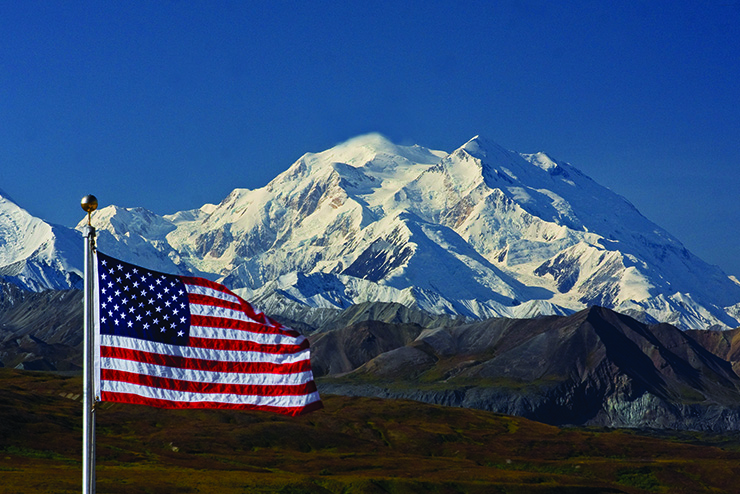Our new President has displayed an interest in toponymy, the naming of places. He instructed the Interior Secretary to reinstate “Mount McKinley” as the name of our nation’s highest peak and to rename the Gulf of Mexico as the “Gulf of America.”
Up here in Northeast U.S.A., some wag has suggested that Long Island Sound should be renamed “Connecticut Sound.” He has been warned that we Long Islanders stand armed and ready.
There is of course nothing new about toponymical revision. The fall of Constantinople in 1453 was commemorated 500 years later by a hit novelty song, Istanbul (not Constantinople):
Why did “Constantinople” get the works?
That’s nobody’s business but the Turks’.
And as the lyricist there pointed out:
Even old New York
Was once “New Amsterdam.”
Why they changed it, I can’t say.
People just liked it better that way.
The past half-century has seen some acceleration in these renamings, driven mainly by postcolonial guilt. Mount McKinley was thus known to the federal authorities until 2015, when the Obama administration changed it to “Denali,” the indigenous-Alaskan name.
The revisions have been worldwide, although not consistent. Peking and Bombay are now Beijing and Mumbai, but we still call Krung Thep “Bangkok” and (mostly) write Kolkata as “Calcutta.”
Renamings can carry political voltage. In the 1850s, when the Manchus still ruled China, Major-General Nikolai Muraviev dispatched a series of flotillas down the Amur River, carrying Russian troops and settlers to assert the Tsar’s interest in Outer Manchuria. Historian Philip Snow, in his 2023 book China and Russia, tells us that:
By the end of 1860 Russian settlers had founded a city on the coast of their new Maritime Province beyond the Ussuri, changing the name of the site from the humble Chinese Haishenwei (“Sea-slug Cliffs”) to Vladivostok—“Ruler of the East.”
That still rankles the Chinese, who in their atlases never fail to show both names.
To return to our new president and his first-month activities, among them has been a restatement of his interest in purchasing Greenland from Denmark, the island’s current proprietor. My entire knowledge of Greenland comes from reading Tété-Michel Kpomassie’s 1981 book An African in Greenland, which portrays the place as an unproductive welfare slum. That may of course be out of date, and there are commercial and geostrategic reasons for thinking that some level of U.S. control over Greenland might be to our advantage.
All that aside, the news reports did not say whether Trump had anything toponymical in mind. I recall a schoolmaster telling us that the original naming of Greenland was promotional: the Vikings wanted to encourage settlement, so they made the place sound verdant. Is that true? You can never be sure with schoolmasters’ tales.
Seeking sounder authority, I went to my 1911 Encyclopædia Brittanica. Greenland gets six-and-a-half pages, written by Norwegian explorer and oceanographer Frdtjof Nansen (1861-1930). “In 982 the Norwegian Eric the Red,” Nansen wrote, “spent three years on its south-western coasts exploring the country. On his return to Iceland in 985 he called the land Greenland in order to make people more willing to go there.”
Prof. Nansen has a sly, engaging style I rather like. Of Greenland’s later history he reports, “In 1807-1814, owing to the war, communication was cut off with Norway and Denmark; but subsequently the colony prospered in a languid fashion.”
So, if Trump’s plans for Greenland include a promotional change of name, he will at least be able to plead historical precedent.
Our president must of course do as he thinks best. Personally, if I were in charge of toponymical revision my first priority would be to prune superfluous occurrences of the definite article in place-names.
There has been some progress here recently. “The Ukraine” seems now to have slimmed down decisively to just “Ukraine,” and it’s been many long years since I heard or saw “The Lebanon” or “The Argentine.”
There has simultaneously been some backsliding, though. Just across the sea from my own nation of birth was another sovereign state, known to us through my infancy and youth as “Holland.” As of January 2020, however, that country is officially, compulsorily, “The Netherlands.”
And when, in December 1992, Slovaks and Czechs parted company, we found ourselves reading about Slovakia and “The Czech Republic.” Is there some other Czech nation we might confuse with the Republic? A Czech Principality, a Czech Kingdom, a Czech Federation, a Czech Union, a Czech Empire? If there is, my atlas doesn’t show it. So why not just “Czechia”?
I of course understand that by writing this from my home in The United States of America I may be charged with calling down fire on my own position; but it’s superfluous definite articles I’m protesting. With no disrespect at all to our Constitution, I consider the first four words of “The United States of America” to be superfluous in everyday discourse. ◆

Leave a Reply